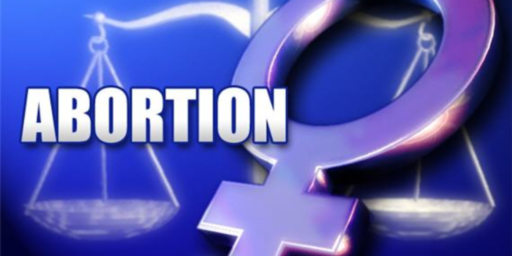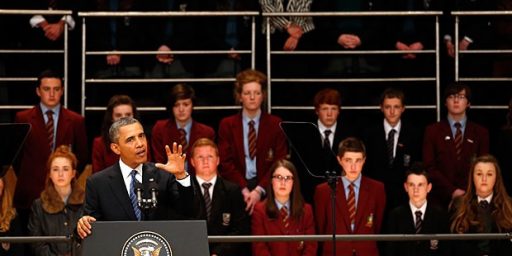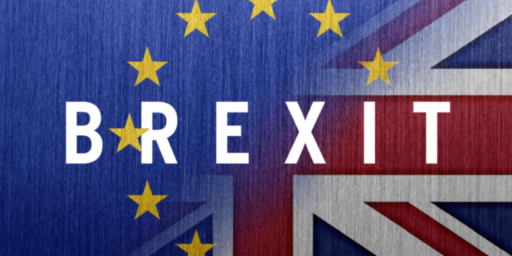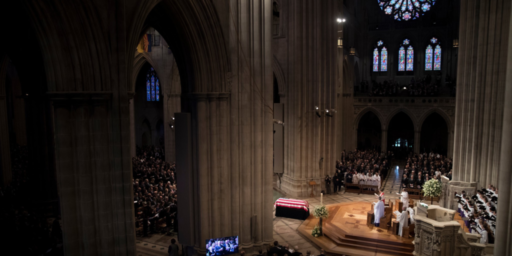Oral History, Confidentiality, and the Courts
The Obama Justice Department is siding against historians trying to protect the confidentiality of their sources.
Glenn Reynolds has a long-running gag in the form “They told me if I voted for John McCain [horrible thing X would happen]: and they were right!” It’s an amusing way of highlighting, depending on your perspective, the hypocrisy of Obama or the amazing bipartisan continuity of presidential power.
Today’s installment, though, falls flat.
THEY TOLD ME IF I VOTED FOR JOHN MCCAIN, THE JUSTICE DEPARTMENT WOULD BE ATTACKING ACADEMIC FREEDOM: AND THEY WERE RIGHT! “Researchers who conduct oral history have no right to expect courts to respect confidentiality pledges made to interview subjects, according to a brief filed by the U.S. Justice Department on Friday. The brief further asserts that academic freedom is not a defense to protect the confidentiality of such documents.”
First, I don’t recall this being a subject of controversy in the 2008 campaign or, indeed, any presidential or other political contest, ever.
Second, this isn’t an issue of academic freedom as commonly understood. No professor is being punished for his political views, research findings, or, indeed, anything.
Third, there’s never been a shield law protecting academics in the way that some localities protect the press; nor do historians have the protections given to psychiatrists or priests. Academic promises of confidentiality are subject to normal subpoena processes.
Fourth, all shield laws have exceptions for investigations into violent crimes, the issue at stake here. From the linked Inside Higher Ed report:
With the filing, the U.S. government has come down firmly on the side of the British government, which is fighting for access to oral history records at Boston College that authorities in the U.K. say relate to criminal investigations of murder, kidnapping and other violent crimes in Northern Ireland. The college has been trying to quash the British requests, arguing that those interviewed as part of an archive on the unrest in Northern Ireland were promised confidentiality during their lifetimes.
The U.S. position in the case deals with a number of issues raised by Boston College — some of which don’t relate to issues of academic rights. (For example, the college suggests that release of the records could endanger the peace process in Northern Ireland, and the U.S. rejects that view.)
On the issues related to the rights of researchers and colleges, the brief rejects all of the college’s arguments. The government argues that there is no right of confidentiality a researcher can grant that would withstand a subpoena. The Justice Department notes that Boston College acknowledged in its communication with research subjects that its confidentiality pledges assure privacy “to the extent American law allows,” which the government says isn’t very far in cases like this — whatever implication may have been read into that statement by researchers or by interview subjects.
Just because college researchers thought they could maintain confidentiality — and told sources they would do so — is no reason for the courts to go along, the brief says. Boston College wants “the court [to] enforce a promise simply because it was unwisely or mistakenly made,” the brief says. “This too should be rejected because it would turn the law on its head. To grant the motion to quash would encourage other persons engaged in collecting ‘oral histories’ — whether they be legitimate academics, or the purveyors of pulp fiction collecting ‘confessions’ about organized crime — to promise complete confidentiality, relying on the court to enforce that ill-advised promise.”
The brief goes on to argue that while professors’ documents have been protected from release in the context of civil lawsuits, this case involves serious criminal charges. Academic protections don’t apply, the Justice Department says.
“Courts have not recognized an ‘academic privilege’ akin to the attorney/client privilege or the Fifth Amendment protection against self-incrimination,” says the federal brief.
[…]
Kathi Westcott, associate counsel of the American Association of University Professors, said that the AAUP recognizes that colleges are not immune from subpoenas. But she said that the association rejects “the government’s contention that academic freedom is irrelevant to the court’s assessment of what circumstances necessitate a response to these types of subpoenas and the scope of response that is appropriate.”
Westcott said it was “disappointing to see the government take a position that disregards clear legal precedent protecting academic research.” She said that many courts have “recognized that academic scholarship is deserving of specified protection and that such protection requires a balancing approach in attempting to ensure that investigative demands are sufficiently factually based and narrow so as to limit the potential chilling effect these types of requests might have on future academic research.”
I’m not unsympathetic to the AAUP position here but think the DOJ has the better of the argument. Indeed, it’s hard to imagine a balancing test in which murder investigations wouldn’t trump academic inquiry.
Glenn’s snarky meme aside, this is a case where we’d expect that a McCain Justice Department would have come down the same way. Given that Glenn and I both voted for McCain, I don’t have any complaint about that.







Privileges not to testify are rare in the law and generally frowned up because they preclude the ability of the court to gather all necessary facts to make a decision. The most well-known privileges are:
1. The privilege against self-incrimination
2. The Priest- Penitent privilege, which prevents a religious figure from being compelled to testify about facts revealed in the course of confession or some similar religious counseling
3. The Marital privilege, which prevents spouses from being forced to testify against one another
4. The Doctor-Patient privilege
Additionally, some states (but not the Federal government) have a journalists privilege of some sort that permits journalists from being compelled to reveal the identity of a confidential source.
The public policy (or constitutional) arguments in favor of each of these privileges are, I think, self-evident. There is no such thing as an “Academic Researchers” privilege and I cannot think of any reason why there should be.
@Doug Mataconis: I would think the argument is identical to that for press: otherwise, you have a chilling effect on access to information useful to the public. But murder trumps both.
@James Joyner:
And it is the journalist privilege that is the most controversial and the most limited. Nine federal circuits have recognized the existence of a qualified (i.e. limited) privilege and 31 states have some form of a shield law, but in no case is the journalists privilege as broad as any of the others. Just ask Judith Miller.
I would imagine that an issue like this gets resolved on a case-by-case basis. There may be some cases where a Judge would decide that the interest in confidentiality trumps the probative value of the evidence. As you said, though, in a murder case there are other interests at stake that are arguably more important.
It’s also worth noting that, other than the marital privilege and the doctor patient privilege, all of the recognized privileges have some basis in a Constitutional right. I don’t think you can make that case for academic research.
Did you forget the attorney-client privilege or is that something else entirely?
@Herb:
I didn’t forget it but I didn’t put it in the list because its not one that typically arises in the course of a trial. Interestingly, it is also the one that is perhaps the most extensive privilege, the only exceptions being if an attorney has knowledge of an his clients intention to commit a crime or if a fraud is being committed on the court, and the only one that remains as strong after death as it is when the client is still alive.
The statutory privilege for the press in my state is so weak, that I don’t think extending it to accademia would change the outcome here. It’s a murder investigation, it’s important.
Glenn Reynolds, making snarky, yet ultimately meaningless posts? Why I never…. Now if you’ll excuse me, I’m going to wind my way through his “Dude, where’s my recession?” posts that were the height of hilarity 3 years ago.
Ironically, this sort of ruling puts academics into a double bind. Much of this sort of research now fall under the jurisdiction of the “Institutional Review Board” — an organization at ever institution that receives government funds that is charged with maintaining research ethics.
Though originally intended to cover medical research, it now applies to most social science activities (thanks frickin Stanley Milgrim). Basically it requires Social Scientists to to take all necessary steps protect the mental, emotional, and physical safety of their subjects. That includes concealing identities.
Here’s the kicker — at any time the Fed’s can audit an University. And, my understanding is all that it takes is for one project’s IRB to be screwed up and EVERYONE at the school’s funding is suspended until the problem is resolved.
So basically, I need to protect the identity and safety of my sources — under government threat of cutting off my funding — except when the government wants those sources — under threat of government action against my freedom.